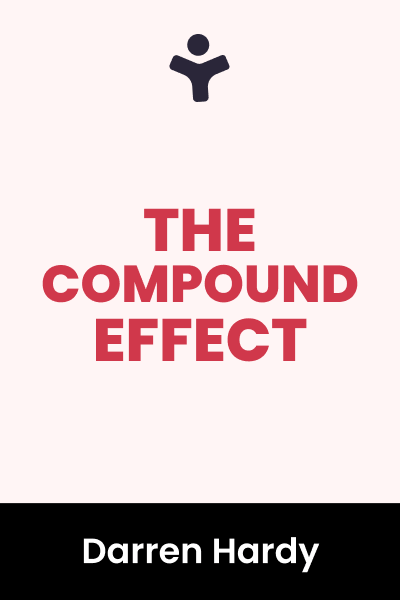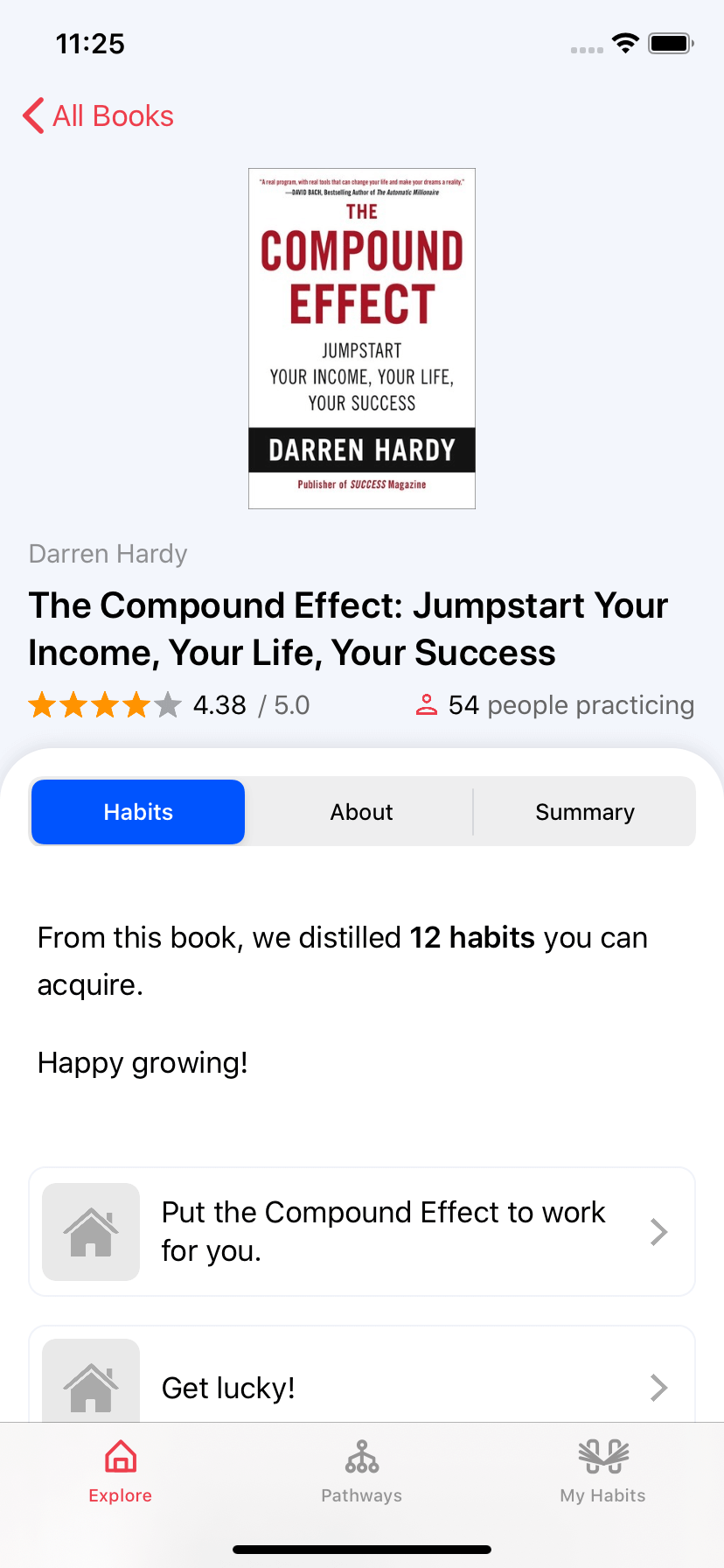
The Compound Effect: Jumpstart Your Income, Your Life, Your Success
Read in the App
Full actionable summary
The Compound Effect is a book about success and what it really takes to earn it. It details how our everyday decisions can either take us to the life we desire or to disaster by default. It explores how our repeated actions over time can always result in disproportionate outcomes to what we often expect. The book challenges us to make choices based on our goals and core values repeatedly and consistently enough to turn them into rewarding habits. It also recommends removing the negative influences around us that could derail our journey to success.
What You'll Learn
This summary distills the key insights from The Compound Effect: Jumpstart Your Income, Your Life, Your Success into actionable steps you can apply immediately. Perfect for busy professionals who want to learn and implement quickly.
Read in the App
Get the full actionable summary with our mobile app
Key Insights & Chapters
The Compound Effect in Action
“Your only path to success is through a continuum of mundane, unsexy, and sometimes difficult daily disciplines compounded over time.”
The compound effect is the principle of reaping huge rewards from a series of small, smart choices. Even though the results are massive, the steps you take don’t feel significant, and the resulting changes are so subtle that they’re almost imperceptible.
Most people get tripped up by its simplicity. Perhaps you have heard a story about someone who quit after a week of running because they’re still overweight or someone who stopped practicing the piano after six months because they realized they’re not great players yet. It could also be about someone who stopped making financial contributions to their retirement funds after a few years because they could just use the cash now —after all, it seems not to be adding up anyway.
When working towards any goal, be it improving our health, relationships, finances, or anything else, we need to realize that the small, smart choices we make consistently over time will always result in a radical change. To others, it may seem like an overnight success. But you’d know, personally, how much time, effort, and consistent sacrifices it will take to achieve your goal.
Actions to Take
Making Choices
“Our choices can be our best friend or our worst enemy. They can deliver us to our goals or send us orbiting into a galaxy far, far away.”
Everything in your life exists because you first made a choice about something. Each choice starts a behavior that, over time, becomes a habit. Every decision, no matter how slight, alters the trajectory of your life. In essence, you make your choices, and then your choices make you.
Our choices are often shaped by our culture and upbringing. They can be so entwined in our routine behaviors and habits that they seem beyond our control. Nobody intends to become obese, go through bankruptcy, or get a divorce. But often, if not always, those consequences result from a series of small, poor choices they made.
You need to become aware of your choices and ensure they support the expansion of your life. You alone are responsible for what you do, don’t do, or how you respond to what’s done to you. So, eliminate all of your excuses and embrace the fact that you’re freed by your choices as long as you assume personal responsibility for them.
Actions to Take
Developing Habits
“A daily routine built on good habits is the difference that separates the most successful amongst us from everyone else.”
95% of everything we feel, think, do, and achieve results from our learned habits. We’re born with instincts but no habits at all. We develop them over time. Beginning in childhood, we learned a series of conditional responses that led us to react automatically to most situations.
In your day-to-day life, living ‘automatically’ has its definite positives. If you had to consciously think about every step of each ordinary task —making breakfast, driving the kids to school, getting to work— your life would grind to a halt. But since we don’t have to, we’re free to focus our mental energy on more creative and enriching thoughts.
Habits can be helpful as long as they’re good ones. If you eat healthfully, you’ve likely built healthy habits around the food you buy and what you order at restaurants. If you’re successful in a sales job, it’s probably because your habits of mental preparation and positive self-talk enable you to stay optimistic in the face of rejection.
Successful people aren’t necessarily more intelligent or more talented than anyone else. But their habits lead them toward becoming more informed, knowledgeable, competent, better skilled, and better prepared.
Actions to Take
Building Momentum
“Achievers —people who get into a successful rhythm— continue busting their butts and end up achieving more.”
Have you ever wondered why successful people tend to get more successful, the rich get richer, the happy get happier, and the lucky get luckier? It’s simply because they’ve got momentum on their side.
Momentum is, without a doubt, one of the most powerful and enigmatic forces of success. You can’t feel it, but you know when you’ve got it. It can catapult you into the stratosphere of success. And once you’ve got it on your side, there’s almost no way anyone can catch you.
It’s not easy to build momentum while adopting a change. You start by taking one small step, one action at a time. You’ll need a lot of energy to break your inertia and get your new habit underway. But once you gain momentum, you’ll be hard to stop, virtually unbeatable, even though you’re now putting out considerably less effort while achieving greater results.
Momentum can work for you or against you. Negative habits, when left unchecked, can build up steam and send you into a tailspin of unfortunate circumstances. To get momentum working for you, you have to make choices based on your goals and core values consistently.
Actions to Take
The Power of Influence
“The funny thing is, more often than not, we are completely unaware of the similarities between us and our circle of five.”
We’re all influenced by these three main factors: input, associations, and environment. To sustain your positive trajectory toward your goals, you’ll need to understand and govern these influences so they support rather than derail your journey.
Input is what you feed your mind. Your associations are the people you spend time with, and your surroundings are your environment.
If you want your brain to perform at its peak, you have to be vigilant about what you feed it. Since so much of what we take in is unconscious, we need an extra level of vigilance to prevent our brains from absorbing irrelevant and counterproductive input.
Your associations determine as much as 95% of your success or failure in life. They determine what conversations dominate your attention and which attitudes and opinions you’re regularly exposed to. Therefore, keeping positive company around you is almost a guarantee for your success.
You get in life what you accept and think you’re worthy of. Once you stop tolerating harmful behaviors from those around you and begin to expect respect and encouragement, it’s amazing how life will organize around the standards you’ve set for yourself.
Actions to Take
Breaking into Greater Heights
“It’s not getting to the wall that counts; it’s what you do after you hit it.”
Everyone does well when things are great. It’s not until situations are difficult that we get to prove our worthiness for progress.
When you hit the wall in your discipline, routines, rhythms, and consistency, you must realize that this is when you need to separate yourself from the crowd and your old self by scaling that wall and finding your new powerful, and victorious self.
Viewing yourself as your toughest competitor is one of the best ways to multiply your results. Another is pushing past what other people expect of you — doing more than “enough.” Giving a little more time, energy, or thought to your efforts won’t just improve your results; it’ll multiply them.
In all areas of your life, look for opportunities where you can go a little further, push yourself a little harder, last a little longer, prepare a little better, and deliver a little bit more. Eventually, the level and speed of your accomplishments will astonish you and everyone else.
Actions to Take
Get Full Access in the App
Download Mentorist to explore detailed action steps, track your progress, and build lasting habits.

Experience the Full Summary
Read comprehensive summaries and track your progress with our mobile app